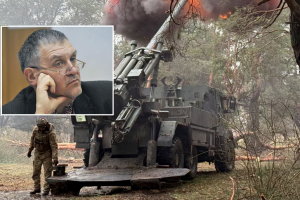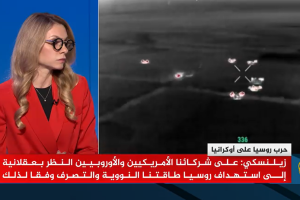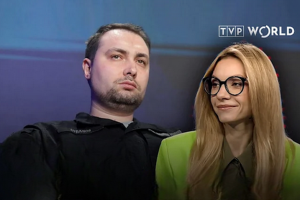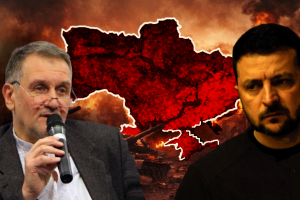Ukrainians wait as Russia faces off with the West

EPA I Christmas in Kyiv has continued as normal, with little sign of anxiety or alert
By Paul Adams
BBC News Kyiv, Ukraine
Sometimes it looks a bit like a diplomatic version of "does he take sugar?"
In Geneva and Brussels, Western diplomats face off against their Russian counterparts, discussing, among other things, Ukraine's ability as a sovereign, independent state, to shape its own destiny.
But Ukraine is not there.
No matter how many times senior US officials repeat the mantra "nothing about Ukraine without Ukraine" - and they repeat it at every opportunity - it's hard for Ukrainians to avoid wondering just what is being discussed behind their backs.
With an estimated 100,000 Russian troops massed on the country's northern and eastern borders, you might think this would be cause for serious alarm.
Orthodox Christmas was celebrated here last Friday, and if you stroll through Kyiv's busy Christmas markets you're not exactly assailed by a sense of heightened alert and anxiety.

"People are used to heavy times," says Petro Burkovsky from one of Kyiv's oldest independent think tanks, the Ilko Kucheriv Democratic Initiatives Foundation. "In the 20th Century, we had many occasions when people lived in daily horror. It's part of their historical memory."
No room for Ukraine
- 10 January: Senior Russian and US diplomats met in the Swiss city of Geneva
- 2 January: Nato-Russia Council meets in Brussels, for the first time since 2019
- 13 January: The Organization for Security and Cooperation in Europe meets in Vienna. The US, Russia and Ukraine are all OSCE members
Ukraine's current horror has been going on for almost eight years, since masked Russian troops first appeared on the streets of Crimea.
Fighting broke out in the eastern Donbas region in April 2014. Since then, 14,000 soldiers and civilians have been killed in what the government in Kyiv calls the "Russian-Ukrainian War". Russia insists to this day that it is not a party to the conflict.
Each morning, at a short, sombre ceremony outside the defence ministry in Kyiv, Ukrainian soldiers killed on that particular calendar day since independence in 1991 are commemorated. The vast majority have died since 2014.
On the morning we attend, four names are read out, each killed on 11 January. The last of them, Oleh Andriyenko, died a year ago.
 Ukrainian Ministry of Defence І A ceremony takes place in Kyiv every day to commemorate those who have fallen
Ukrainian Ministry of Defence І A ceremony takes place in Kyiv every day to commemorate those who have fallen
Each name is met with a volley of gunfire and the toll of a bell.
Across town, the faces of dead soldiers stare out in serried ranks from the walls of St Michael's Cathedral in a memorial that stretches for almost 100m.
Passers-by stop and reflect, undeterred by the snow and freezing temperatures.

Viktor Moroshan, 63, was injured during the ferocious battle for Ilovaisk in August and September 2014. He points to the faces of fallen colleagues from the volunteer Donbas Battalion, which took heavy losses.
"Everyone had one goal," he says finally. "To liberate our land from those Russians."
Viktor met his wife, Tetyana, while he was recovering in the hospital in where she was a volunteer.
"Maybe the war will be big next time," she says. "He [Putin] has a lot of plans to start a new war. It's not a fairy tale."
Viktor describes himself as ethnically Russian, from one of the areas now under rebel control. But his hatred for Russian leader Vladimir Putin is deep. "He's a maniac. A killer."
Retired now, he says he still keeps an emergency bulletproof vest and helmet ready.
"My wife says 'Vitya, maybe you shouldn't.' But I say we need to be ready. No-one else can defend our fatherland but us."
It's the kind of defiant talk you might expect in a country facing potentially overwhelming odds and knowing that if it comes to a fight, there will be limits to support from outside.
Ukraine's Western allies talk of "massive" consequences if Russia mounts an incursion. But while those could well include increased military assistance, it would be Ukrainians alone doing the fighting and the dying.
Hence the growing support for Nato membership.
"Every time Russia starts an escalation in the front line, support for Nato membership grows," says Petro Burkovsky, "and the readiness to make concessions with Russia falls."

Publicly, Nato leaders say the door to membership, opened to Ukraine and Georgia in 2008, is still open.
Ukraine's deputy prime minister, visiting Nato headquarters in Brussels on Monday, repeated her government's refrain.
"We have the inherent, sovereign right to choose our own security arrangements," Olga Stefanishyna told reporters. "Including treaties and alliances."
But it's hardly a secret that Nato membership is not on the cards right now. Western officials know it's the very thing most likely to provoke the military confrontation they're so anxious to avoid.

Mr Burkovsky says Ukraine has little choice but to wait out a slow-burning, long-term crisis.
"Right now we have to accept the reality of confrontation and conflict with Russia," he says.

"Maybe in the course of time, the situation in Russia will change. Russia will not be as formidable as it is now, Ukraine will be stronger and the West will be more decisive towards Ukraine and towards Russia."
For the time being, he says, Ukraine should concentrate on avoiding the fate of two of Russia's other neighbours, Belarus and Kazakhstan.
"They show the fate of people in countries that are Russian satellites," he says. "Most people in Ukraine don't want this destiny for them and of course for their children."








